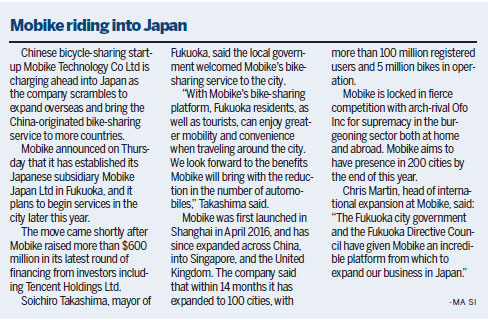Buoyed by the success of the nation's ride-hailing and bike-sharing sectors, Chinese companies and consumers are set to benefit from the country's intensified efforts to drive the rapidly expanding sharing economy.
Chinese ride-hailing giant Didi Chuxing said it is important to develop the new economy to cut overcapacity and generate sustainable long-term economic growth.
The central government approved a guideline to boost the blossoming sharing economy at a State Council executive meeting on Wednesday, saying it will help the nation adapt to the global technological and industrial revolution and foster new growth momentum.
According to the guideline, entrepreneurs are encouraged to tap into the sharing economy, and the authorities will introduce new access and supervision policies to remove industrial and regional barriers to the sustainable development of the sharing economy.
A report released in February by the State Information Center and the Internet Society of China reveals the market for the sharing economy reached 3.45 trillion yuan ($505 billion) in 2016, an increase of 103 percent year-on-year.
Having taken notice of the ballooning sharing economy, the Chinese government expects it to grow 40 percent year-on-year over the next few years. By 2020, it is set to account for more than 10 percent of total GDP.
Li Heng, a student at Peking University, is a frequent user of shared bikes and ride-hailing services.
"The sharing economy has really brought convenience to my daily life. I can easily take a ride by simply tapping my smartphone. But some problems still bother me, such as the lack of shared bikes when I am in a hurry or the high cost of booked cars during peak times," Li said.
Zhang Xu, a senior analyst at Beijing-based internet consultancy Analysys, said the new guideline will help to remove regional barriers from the development of the sharing economy.
Contact the writers at ouyangshijia@chinadaily.com.cn

(China Daily USA 06/23/2017 page18)